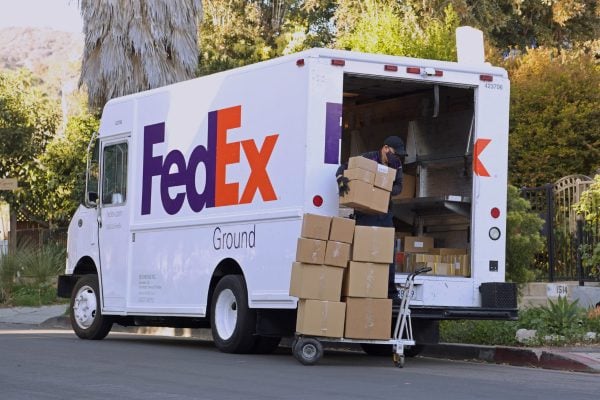“It’s not about fast, it’s about precise delivery,” is how Neil Ashworth sees an ideal delivery promise.
While fast delivery has been the main criteria in last mile experience, the chief executive officer (CEO) of CollectPlus and chief strategy officer (CSO) of Yodel states, precision over speed dependability is what merchants should take into account regarding deliveries.
Speaking with Tamebay, Neil argues on the “importance of service execution.” That is, for sellers to deliver upon their words so that the customers continue to trust their delivery promise.
To help sellers stay in-tune with emerging customers’ expectations, Yodel now offers a two-hour delivery window and two-hour collection capability which would ensure that consumers’ products would turn up on time.
Free delivery vs cost management
Neil says that for merchants, the idea of so-called “free delivery” is a myth. The costs for suppliers to move goods to the customer has been widely discussed in sellers’ forums, with many agreeing to struggle to keep up with delivery fees.
Pointing to sellers’ trading in the “era of free delivery” brought on as a result of some of the largest players in the field, he acknowledges that sellers can fall into the trap of putting pressure on their margins by focusing on one-time purchases.
As a solution to offering free delivery and balancing costs, sellers need to consider strategies that would “encourage profitable buyer behaviour.” What he means by that is to consider offering multibuy (which eBay recently introduced) and subscribe and save options so that the size of the basket can mitigate the delivery costs.
Reiterating what an excellent delivery service should look like, he says a part of is knowing your customer. As he says: “Sellers need to get into a mindset of their customers, know their behaviours, and lifetime value.” It is about delivery accuracy and time, it is about tracking services and added value solutions.”
The other option preferred by click-and-collect customers is often considered to give shoppers a control and flexibility of parcel collection.
Neil describes CollectPlus as the UK’s largest parcel shop available to hand to relieve the pressure of delivery costs. Boasting a growing pool of more than 7,000 click-and-collect locations, which are open seven days a week, he argues that this approach “as one of the cheapest.”
What can sellers learn from their counterparts in the east? He cites JD.com as a pioneer of capabilities which “weren’t possible in the past.” The online marketplace now ships to 99% of the Chinese population within 11 hours.
Brexit concerns
When asked about the company’s focus on the post-Brexit environment, he puts its simply: “we don’t know what’s fully going to happen after Brexit.”
Yodel and CollectPlus are “currently reviewing services for merchants selling internationally and overseas sellers to support them going forward – but the message is really to watch the space.”










11 Responses
Neil, agree it is not always about fast delivery. But having your ebay returns dumped in the rain also plays a big part of decision making when choosing which courier to use.
Price is also a huge factor, using MyHermes pricing for 2kg small parcels on eBay is £2.79 yet Collect Plus want £4.69 on their own website. Anything over 2kg usually goes via UPS using UPS Today for £6 which is a next day service.
So not only is my experience of Yodal and Collect Plus really poor the prices just don’t compete.
Well said Rob
we found the great delivery of Yodel and Hermes classed a blue recycle bin as a safe place.
It is very safe.
No-one could steal it as within an hour it was neatly tipped into the back of a solid steel truck with extra wrapping of paper, plastic, cardboard and tins protecting it and driven away by a group of men protecting their cargo. Later after driving it around securely for a few hours they took it to a plant where it was placed in a huge mountain of stuff all to be passed along a conveyor belt and carefully sorted by hand. To be separated from the correct stuff and later shared out in the staff canteen of the recycling plant. So it safely reached someone. Just not the buyer.
Now if that’s deemed a safe place no wonder we swapped delivery companies.
I agree with the above 100% because my experiences with these services is the same. Specifically: Collect Plus prices are not competitive and Yodel is the only delivery service to me as a BUYER from more than one eBay seller that have been dumped outside near rubbish bins with no attempt at contacting me and messages “confirming delivery”. Thus, I have never tried to use them as a SELLER.
Also, the opening statement that it’s not always about fast delivery is not helpful when eBays new policy REQUIRES a fast delivery as they say they have found it a “big button” with the public. So it would have to be FAST AND PRECISE delivery at a COMPETITIVE price.
I agree with the above 100% because my experiences with these services is the same.
Also, the opening statement that it’s not always about fast delivery is not helpful when eBays new policy REQUIRES a fast delivery as they say they have found it a “big button” with the public. So it would have to be FAST AND PRECISE delivery at a COMPETITIVE price.
I agree with the above 100% because my experiences with these services is the same.
Also, the opening statement that it’s not always about fast delivery is not helpful when eBays new policy REQUIRES a fast delivery as they say they have found it a “big button” with the public. So it would have to be FAST AND PRECISE delivery at a COMPETITIVE price.
I think the jury is out on the consent of “Safe Place”.
Has the delivery really been left in a safe place, or just thrown against the front door, chucked over the back gate, or delivered to a wheelie bin. It’s in the carriers interest to deliver as much as possible on the first attempt, so the notion of a safe place is very subjective, especial when the aim is to get rid of the package.
Is it safe from theft? Is it safe from rain? What is safe and who is qualified to make that distinction. Having worked in the industry for a while now, I know that safe means deliver and most drivers make little or no attempt to consider if a location is really safe. Its just a phrase that we’ve all gotten used to that means delivered without signature.
If the recipient however agrees or contracts with a carrier directly to always deliver the item to a point that they have specified as safe and the carrier does so, I don’t think there is an issue. Everything else is left at door, or left without a signature, but used as an excuse to justify a delivery.
Lets take Amazon as an example, most items are left “safe” and don’t need a signature to confirm delivery. They have GPS technology that helps eradicate risk, but its their policy to treat the customer as King, or Queen and if challenged, they usually do the right thing. The risk is built into their business model, but as a fellow commentator has already suggested, price is so important to the consumer, that mainstream generic carriers don’t have the margins in the delivery charges to be that customer focused. (Regardless of marketing)
So I guess I have to pass the question back to us, the clicking public who’s emotional investment is so linked to delivery that it can make or break a reputation. We have to choose how we want our retailers to interact with the carriers to deliver a service that we can be happy with. There are choices.
1) Go back in time. No signature, no delivery, but you collect or pay again for a 2nd attempt.
2) You contract with the carriers and define a safe place where everything is left at your risk. (The carriers will need to offer this service first)
3) You get the convenience of delivery, you pay the same, but you let the carriers decide safe and accept the status quo.
4) You pay more for delivery, which might give the carriers wiggle room to look at things more sympathetically or develop new services which can be fully costed to meet the needs of the consumer.
Or of course you can have it delivered to one of the numerous Click & Collect providers and pick the item up when its convenient to you.
We have to be realistic and reflect on the value of the service we have purchased. Was it free, or very cheep, under £3.00? If the answer is yes and your package was at your front door when you got home, then I think you could argue that you received value for money. If you paid £15 for delivery and the package was in bits over your front lawn, or in the back of a refuse truck, then I think there is a point to argue and take the issue up with your retailer.
Numerous studies show that we want convenience, but when pushed at check out, we don’t want to pay for it. Anything over £5 and its almost as though the world has come to an end and the very screen you’re looking at has offended you beyond measure. You’ll never shop at that retailer again and tell all of your friends how disgusted you are. But under that and the nearer the offer is to free, the better we feel, but we have to adjust our delivery expectations in accordance with the value we have, or have not, paid.
As soon as i saw someone who was chief strategy officer (CSO) of Yodel talking about ‘ precise delivery ‘ I new choked on my coffee. What planet is this guy on? Yodel is solely built on offering the lowest possible rates to big retailers and enabling them by paying the lowest possible rates to their couriers along with the highest possible amount of parcels to deliver in a single day.
We all jump on the poor delivery person, but many have the most unrealistic amount of drops to do it is no wonder they don’t get time to think, or for the pathetic amount they are paid to do it… simply don’t care!
The wife did a short stint for yodel a couple of years ago. No stranger to delivering stuff as used to do it for waitrose! I was shocked… parcels often didnt get dropped off to her until mid morning, then she had to plan her own route, often people weren’t in and you had to go back again. The level of parcels was obscene. Perhaps even more scary was that some were clearly marked as hazardous chemical items and being in the chemical retailing industry myself, i knew that she was not trained to deal with such things, nor was her car insurance going to cover it under a normal business policy. In fact you need to not only use licenced carriers for it, but the staff must be fully trained…. Yodel are licenced, but their self employed couriers are not trained and so not covered! So she contacted her area person who ‘spoke to her manager’ who told her it was fine…. When she said that i was ‘in the know’ and it simply wasnt, she ws told just to leave them and they would collect the next day and pass to another driver!!!! Pity the poor sod who doesn’t know, something happens and they are liable. She left, I told them i would be reporting it to the relevent people…. i was told, ‘yeah whatever, nothing will change so go waste your time!’
So would i trust Yodel with my customers? Hell no…. Yodel couldn’t deliver a precise service if the world depended on it… after all just look at every single survey that comes out, showing them bottom of the pack!
Royal Mail update: on the tracking page I have just seen this on one of my deliveries
“We delivered your item to your neighbour SUE at 16,crawley…”
Not seen this announced anywhere.
The best way to mitigate free or very low comparative delivery cost to a courier business is to have a premium rate enquiry phone line. Let me explain: Don’t deliver the item to the right place, nor safely or at all. List on the convenient on-line or text tracking it was indeed delivered then have the recipient call a premium rate number to the delivery company with whom they don’t have the delivery contract. As they are not the customer who has the contract for the delivery they shouldn’t talk about the delivery at all, don’t tell the recipient this. feed them a few lies, keep them on the line for as long as possible, ask them to make a second irrelevant call in 24hours if you can do this over a few days even better to not be able to legally discuss the missing items. This way each mis-delivery can earn the courier company up to £10-15 each item and they can keep those savings. The bonus to all this is that then the claim / cost of replacement for the lost item goes to the sender who was looking for a delivery company to contract to deliver their goods.